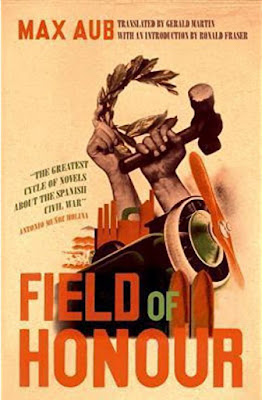Field of Honour
Field of Honour was written by Max Aub in exile in Paris, May to
August 1939, and published in Mexico in 1943. Between the writing and the
publication – the author’s internment by the French and deportation to a
Concentration Camp in Algeria. Although a Spanish national, he was denounced as
a ‘German Jew’ and as ‘a notorious communist and active revolutionary’. More
could be said about the novel and its author: suppressed during the Franco
period, the novel did not receive its due attention in Spain
during the author’s life (he died in 1973). These facts I have gleaned from the book's introduction.
Field of Honour centres
on the life of one Rafael López Serrador, who grows up in the period between
the dictatorship of Primo de Rivera, and the ill-fated Second Republic.
Serrador leaves his small town for Barcelona, where he finds work and then
education through a worker’s institute and his own wide-reading of everything
from Spanish poetry to Tolstoy. Much of the novel consists of recorded dialogue
as the young man mixes with different sides of the political spectrum: from
Communists, to Anarchists, to Reactionaries and the Falange. Seeking personal
freedom and perhaps swept up by an intellectual Falange-leader, Serrador seems
eventually to have found his cause – until the fighting breaks out in Barcelona
in the first days of the Spanish Civil War, and he is drawn back to the
Anarchists and their immediate passion for a new society.
This was an age of dichotomy and simplification. For
example, charismatic Falange-leader Luis Salomar thinks: ‘there were only
Spaniards and Arabs’ (p.111). He longs for Castilian Spain, in the days of
conquest and glory of empire. Preparing for the coming military coup, Serrador
waits in a garden with other young recruits, and Aub takes a moment to divert
the reader’s attention to the garden itself. He writes: ‘carnation beds with
neat little fences, pink coping everywhere; gleaming yellow corncobs and
crimson strings of dried peppers hanging down from the roof; tangled
bell-shaped vetch flowers following wire netting along the sun-blistered walls
…’ (p.161). It hardly seems the place for marksman practice, in other words,
and is nicely juxtaposed to the immediate violence and the shift to the action
of the coup and the tragedy that this unfolds on Spain over the protracted
civil war.
Field of Honour is the first of a six-novel epic, The Magic Labyrinth, and centres on the
events leading to Barcelona’s overthrow the military coup within the city in
1936. As such, we have a glimpse of hope and victory: ‘shivers of triumph run
through the city, cars and trucks full of workers, men and women, soldiers in
the air, cheering’ (p.230). The final chapter ‘Death’ lists the fate of the
various characters who have made up Serrador’s encounters in the years before
this temporary state of revolution within the coup: their deaths on the front
line, or by firing squad, or by various fates. Even had he not included this,
the dialogue about politics before the ‘action’ of the ending would have left
the reader with little hope of peace or utopia in Spain in this terrifying
period of history. For this and other reasons, the novel would appear to be one
that would inform any reader of the complexity of historical forces in an age
of turmoil in Spain and beyond. I read it in one sitting (broken up, I must
admit, by meals and sleep, as befits a holiday in France).




Comments
Post a Comment